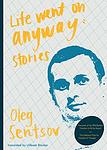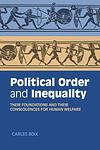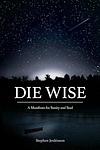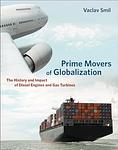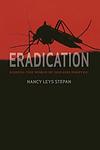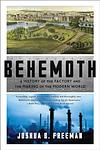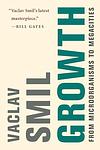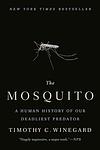The Greatest Canadian, Unknown "Nonfiction" Books Since 2010
Click to learn how this list is calculated.
This list represents a comprehensive and trusted collection of the greatest books. Developed through a specialized algorithm, it brings together 305 'best of' book lists to form a definitive guide to the world's most acclaimed books. For those interested in how these books are chosen, additional details can be found on the rankings page.
Genres
Countries
Date Range
Reading Statistics
Click the button below to see how many of these books you've read!
Download
If you're interested in downloading this list as a CSV file for use in a spreadsheet application, you can easily do so by clicking the button below. Please note that to ensure a manageable file size and faster download, the CSV will include details for only the first 500 books.
Download-
1. 12 Rules For Life by Jordan B. Peterson
"12 Rules for Life" by Jordan B. Peterson is a self-help book that offers practical advice on how to navigate the complexities of life and find meaning and purpose. Drawing from a wide range of disciplines, including psychology, philosophy, and biology, the author presents twelve rules that encourage readers to take responsibility for their actions, confront chaos and suffering, and strive for personal growth and fulfillment. With a blend of personal anecdotes, scientific research, and philosophical insights, this book aims to provide readers with practical tools to improve their lives and find harmony in an increasingly chaotic world.
The 7905th Greatest Book of All Time -
2. An Immense World by Ed Yong
"An Immense World" is a collection of science essays written by Ed Yong, a science journalist. The book explores a wide range of scientific topics, from the behavior of animals to the complexities of the human microbiome. Yong's writing is accessible and engaging, making complex scientific concepts easy to understand for readers of all backgrounds. The essays are thought-provoking and provide a glimpse into the fascinating world of science. Overall, "An Immense World" is a must-read for anyone interested in science and the natural world.
The 8559th Greatest Book of All Time -
3. Life Went On Anyway by Oleg Sentsov
"Life Went On Anyway" is a powerful memoir that chronicles the life of Oleg Sentsov, a Ukrainian filmmaker who was wrongfully imprisoned by the Russian government. Through his vivid and poignant storytelling, Sentsov shares the harrowing details of his arrest, imprisonment, and the relentless fight for justice. Despite the unimaginable hardships he endures, Sentsov's resilient spirit shines through as he reflects on the power of art, the importance of freedom, and the indomitable human will to survive.
The 9004th Greatest Book of All Time -
4. Political Order And Inequality by Carles Boix
This book delves into the intricate relationship between political dynamics and social inequalities, offering a comprehensive analysis of how political institutions shape economic disparities and vice versa. The author argues that the formation of political order and the distribution of resources within a society are deeply interconnected processes, influenced by historical events, economic pressures, and power struggles. Through a detailed examination of various political systems and historical contexts, the book presents a theoretical framework for understanding the mechanisms through which political stability and inequality are mutually reinforced, suggesting that the path to a more equitable society lies in the careful restructuring of political institutions to address the root causes of inequality.
The 9076th Greatest Book of All Time -
5. Die Wise by Stephen Jenkinson
The book in question is a profound meditation on the necessity of acknowledging and accepting death as an intrinsic part of life. It challenges the modern denial of death and the prevalent notion of "dying well." Through a blend of storytelling, wisdom, and cultural critique, the author, who has worked extensively in palliative care, argues for a radical shift in how we perceive and approach the end of life. He advocates for a deep responsibility to dying people and a reimagined relationship with death that involves wisdom, community, and a recognition of its place in the natural order of things. The book serves as a call to awaken to the ways in which our cultural practices often leave us ill-prepared for the inevitable journey of dying, urging readers to live and die with a sense of true understanding and purpose.
The 9078th Greatest Book of All Time -
6. Why America Is Not A New Rome by Vaclav Smil
This book presents a detailed comparison between the United States and ancient Rome, debunking the popular notion that America is following the same trajectory as the Roman Empire towards decline and fall. The author meticulously examines various dimensions including military power, political systems, social structures, and economic dynamics to highlight the fundamental differences between the two entities. Through a rigorous analysis, it is argued that simplistic analogies between Rome and the United States overlook significant dissimilarities, particularly in terms of resilience, adaptability, and global influence, ultimately making the case that America's path is distinct from that of ancient Rome.
The 9206th Greatest Book of All Time -
7. Prime Movers Of Globalization by Vaclav Smil
This book provides a comprehensive analysis of the technological innovations and energy systems that have been pivotal in driving globalization from the mid-19th century to the present day. It focuses on the development and impact of diesel engines, gas turbines, and the containerization of cargo, illustrating how these innovations have significantly increased the efficiency, speed, and scale of global trade and transportation. The narrative underscores the critical role of energy transitions in facilitating economic growth and interconnectivity across continents, while also considering the environmental and geopolitical implications of our reliance on fossil fuels and the urgent need for sustainable alternatives. Through a detailed examination of technological advancements, the work offers insights into the complex dynamics that have shaped the modern globalized world.
The 9206th Greatest Book of All Time -
8. Dark Matters by Simone Browne
"Dark Matters" is a critical examination of how race and surveillance have intersected throughout history, particularly within the context of blackness. The book delves into the ways in which surveillance practices, both historical and contemporary, are rooted in racial discrimination and how these practices have served to enforce boundaries of social control. By exploring a range of topics, from the branding of slaves in the 18th century to modern-day policing and biometric technologies, the book challenges readers to consider the pervasive nature of surveillance and its disproportionate impact on black communities. Through this lens, the author reveals the deep-seated connections between visibility, race, and the monitoring of bodies in public and private spaces, urging a reevaluation of the role of surveillance in perpetuating systemic racial inequalities.
The 9237th Greatest Book of All Time -
9. Eradication by Nancy Leys Stepan
This book provides a comprehensive examination of the concept and practice of disease eradication from a historical perspective. It delves into the scientific, ethical, and political dimensions of the global efforts to eliminate diseases, focusing on case studies such as smallpox, malaria, and polio. The narrative critically assesses the successes and failures of these campaigns, highlighting the complexities and challenges involved in attempting to wipe out diseases. Through a detailed analysis, the book explores the implications of eradication efforts on public health policies and practices, questioning the feasibility and desirability of pursuing eradication as a goal in the face of evolving disease dynamics and global health landscapes.
The 9290th Greatest Book of All Time -
10. Sustainable Materials by Julian M. Allwood
This book provides a comprehensive exploration into the world of sustainable materials, focusing on the environmental impact of material production and usage. It delves into the science and engineering behind creating materials that are not only durable and functional but also minimize harm to the environment. Through a detailed analysis of various materials, the book offers insights into how industries can shift towards more sustainable practices. It emphasizes the importance of reducing material consumption, recycling, and reusing resources as key strategies for achieving sustainability. The book serves as a crucial resource for engineers, designers, policymakers, and anyone interested in the sustainable development of materials and its significance for the future of the planet.
The 9378th Greatest Book of All Time -
11. The Great Escape by Angus Deaton
This book delves into the historical journey of human progress, particularly focusing on how health and prosperity have evolved over time to create significant disparities in wealth and well-being across different populations. It examines the mechanisms of growth and the spread of prosperity, alongside the challenges and inequalities that have emerged. Through a detailed analysis, the narrative explores the roles of technology, innovation, and government policies in shaping the economic landscapes and the distribution of resources. The author critically addresses the complexities of escaping poverty and the ethical considerations surrounding aid and intervention in less developed economies. The work is a comprehensive exploration of the global patterns of health, wealth, and inequality, offering insights into the potential paths toward a more equitable world.
The 9498th Greatest Book of All Time -
12. Making The Modern World by Vaclav Smil
This book provides a comprehensive exploration of the materials that have shaped human history, from the Stone Age to the present. It delves into how the extraction and use of various materials, including metals, fossil fuels, and biomass, have been pivotal in the development of civilizations and the modern industrial world. The author examines the environmental and societal impacts of material consumption, emphasizing the sustainability challenges posed by our ongoing reliance on these resources. Through a detailed analysis of material flows and innovations, the book offers insights into the complexities of achieving a more sustainable future and the critical role of efficient material use in making the modern world.
The 9498th Greatest Book of All Time -
13. The Bet by Paul Sabin
This book delves into the high-stakes wager between two influential figures, an economist and a biologist, who held opposing views on the future of global resources and population growth. Set against the backdrop of the latter half of the 20th century, the narrative explores the broader debate on environmental policy, economic growth, and the limits of Earth's resources. Through the lens of this famous bet, the author examines the impact of their clash on public discourse and policy, highlighting the complexities of predicting the planet's environmental future. It serves as a fascinating case study on how scientific debates can influence political and public opinion, and the challenges of balancing resource sustainability with human progress.
The 9498th Greatest Book of All Time -
14. The Tiger by John Vaillant
"The Tiger" is a non-fiction book that delves into the gripping account of a man-eating Amur tiger's deadly rampage in a remote Russian village in the late 1990s. The narrative explores the complex relationship between humans and nature, highlighting the impact of poaching and habitat loss on the tiger's behavior. Through meticulous research and vivid storytelling, the book weaves together local history, conservation science, and socio-economic factors, offering a profound examination of the consequences when human encroachment and environmental degradation provoke the fierce retaliation of one of nature's most formidable predators.
The 9529th Greatest Book of All Time -
15. When We Cease To Understand The World by Adrian Nathan West, Benjamin Labatut
"When We Cease To Understand The World" is a collection of two novellas that explore the limits of human knowledge and the consequences of scientific discovery. In "The Immaculate Void," a mathematician becomes obsessed with solving a seemingly unsolvable equation and risks his sanity in the process. In "The Unfinished," a group of scientists race to unlock the secrets of nuclear fission, only to realize the devastating power they have unleashed. Through these stories, the authors question the role of science in society and the dangers of pursuing knowledge without considering its ethical implications.
The 9546th Greatest Book of All Time -
16. War by Margaret MacMillan
"War" by Margaret MacMillan is a comprehensive analysis of the causes, conduct, and consequences of war throughout history. Drawing on a vast range of sources, including personal accounts, political documents, and military strategy, MacMillan explores the human motivations behind war and the complex web of political, economic, and social factors that drive nations to conflict. She examines the impact of war on individuals and societies, from the trauma of soldiers on the front lines to the far-reaching political and economic consequences of global conflicts. Ultimately, MacMillan argues that war is a deeply human phenomenon, shaped by the complex interplay of individual and collective desires, fears, and ambitions.
The 9546th Greatest Book of All Time -
17. Exoplanets And Alien Solar Systems by Tahir Yaqoob
"Exoplanets and Alien Solar Systems" provides a comprehensive overview of the field of exoplanet research, exploring the methods used to discover and study planets beyond our solar system. The book delves into the various types of exoplanets discovered, the characteristics of these distant worlds, and the implications for understanding our place in the universe. It also discusses the technological advancements and scientific principles underlying exoplanet detection and analysis, offering insights into future prospects and challenges in the field. This work serves as both an informative guide for those new to astronomy and a detailed resource for seasoned researchers interested in extraterrestrial planetary systems.
The 9601st Greatest Book of All Time -
18. The Routledge Handbook Of Panpsychism by William Seager
The book serves as a comprehensive guide to panpsychism, the philosophical view that consciousness is a fundamental and ubiquitous aspect of the physical world. It brings together contributions from leading scholars to explore various aspects of this theory, including its historical roots, its philosophical implications, and its compatibility with contemporary science. The handbook examines arguments for and against panpsychism, discusses its potential solutions to the mind-body problem, and considers its implications for our understanding of the nature of consciousness and the physical universe. This collection not only provides a detailed overview of current debates but also charts potential future directions for research in this area.
The 9648th Greatest Book of All Time -
19. Figuring by Maria Popova
"Figuring" explores the complex interconnections between the lives of several historical figures across four centuries, primarily focusing on women who have made significant contributions to science, art, and culture. The narrative weaves together the personal and professional endeavors of these individuals, highlighting their struggles, relationships, and the societal challenges they faced. The book delves into themes of love, discovery, and the pursuit of knowledge, illustrating how these elements are intertwined in the human experience and how the contributions of these figures have shaped our understanding of the world.
The 9662nd Greatest Book of All Time -
20. Trans by Juliet Jacques
"Trans" is a candid and poignant memoir that chronicles the personal journey of transitioning from male to female, exploring the complexities of gender identity and the challenges faced by transgender individuals. The author offers an intimate look into their experiences with gender dysphoria, the medical processes of transitioning, and the social implications of living as their true self. The narrative also delves into the broader cultural and political issues surrounding trans rights and representation, providing a nuanced perspective on the intersection of personal and political in the quest for authenticity and acceptance in society.
The 9680th Greatest Book of All Time -
21. The Age of Surveillance Capitalism by Shoshana Zuboff
The book explores the emergence of surveillance capitalism, a new form of capitalism that thrives on personal data. The author details how tech companies, such as Google and Facebook, collect and use personal data to predict and modify human behavior as a means to produce revenue and market control. The book delves into the consequences of this phenomenon on economy, society, and democracy, warning about the dangers of unchecked data collection and manipulation.
The 9989th Greatest Book of All Time -
22. Growth by Vaclav Smil
This book provides a comprehensive exploration of growth in various domains, including biological, societal, economic, and technological realms. The author meticulously examines the principles and patterns of growth, from the microscale of organisms to the macroscale of human civilization. Through a detailed analysis, the narrative delves into the implications of unchecked growth, particularly focusing on the sustainability challenges it poses to the environment and future generations. The work is a thought-provoking synthesis that encourages readers to reconsider the conventional pursuit of growth, advocating for a more measured and sustainable approach to development across all facets of life.
The 10046th Greatest Book of All Time -
23. The Mosquito by Timothy C. Winegard
This book presents a compelling examination of how the mosquito has been a pivotal force in shaping human history. Through meticulous research, it uncovers the profound impact these tiny insects have had on wars, colonization, and the spread of diseases across continents. The narrative delves into the biological and ecological aspects of the mosquito, revealing how its role as a carrier of deadly pathogens like malaria, yellow fever, and dengue has influenced the outcomes of battles, the fates of empires, and the lives of billions of people. By weaving together historical events with scientific insights, the book offers a unique perspective on the mosquito's place in the world and its indelible influence on human civilization.
The 10046th Greatest Book of All Time -
24. No Turning Back by Rania Abouzeid
"No Turning Back" provides a gripping and intimate portrayal of the Syrian war through the eyes of four individuals whose lives are transformed by the uprising against the Assad regime. The narrative delves deep into the personal stories of a young revolutionary, a child refugee, a jihadist, and a disillusioned government soldier, offering a nuanced and humanizing perspective on the complex conflict. The book captures the brutal realities and emotional depths of the Syrian struggle, highlighting the enduring human spirit amidst chaos and destruction.
The 10207th Greatest Book of All Time -
25. How To Avoid A Climate Disaster by Bill Gates Sr.
In "How to Avoid a Climate Disaster," the author presents a comprehensive and accessible exploration of the challenges and potential solutions to mitigate climate change. Drawing on his extensive experience in technology and philanthropy, he outlines the current state of global emissions and their impacts on the planet. The book emphasizes the importance of innovative technologies and government policies in transitioning to cleaner energy sources. It offers a pragmatic approach to reducing greenhouse gas emissions to zero by advocating for a combination of renewable energy adoption, carbon capture techniques, and advancements in agriculture and manufacturing. The author's insights aim to mobilize individuals, businesses, and policymakers towards urgent action to avert the catastrophic effects of climate change.
The 10259th Greatest Book of All Time
Reading Statistics
Click the button below to see how many of these books you've read!
Download
If you're interested in downloading this list as a CSV file for use in a spreadsheet application, you can easily do so by clicking the button below. Please note that to ensure a manageable file size and faster download, the CSV will include details for only the first 500 books.
Download

